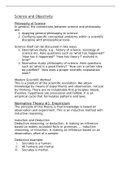Class notes
Class notes on Science and Objectivity (W_BA_PNEU)
- Course
- Institution
Detailed description of empiricism and fablsificationism. Considers induction and deduction and gives examples for each. Looks at the empirical cycle and evaluation.
[Show more]




